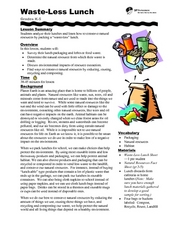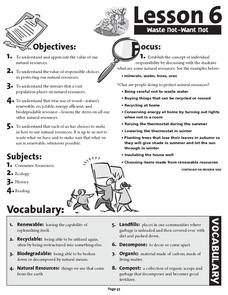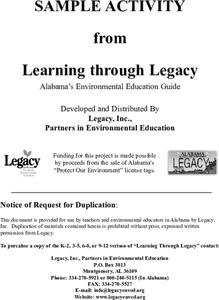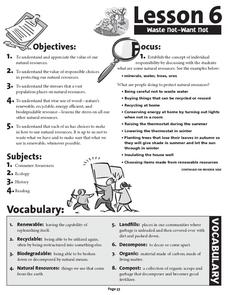PricewaterhouseCoopers
Waste and Recycling: Recycling and Energy Recovery
Reduce, reuse, recycle, and recover. Young environmentalists learn about the overwhelming amount of garbage produced and discover better ways to minimize their impact on Earth by learning the difference between garbage and recyclables.
American Museum of Natural History
Be a Water Saver
Everyone must do their part to make a difference. The lesson link provides an 11-item questionnaire to reflect on conservation practices. Simple and straightforward, the lesson is perfect as a remote learning resource or as a tool for an...
SF Environment
Waste-Less Lunch
Is it possible to have a waste-less lunch? Can your class become leaders in conservation? Discuss the importance of reducing waste during lunch time with a fun lesson that can be extended to everyday practices. First the class examines...
Curated OER
How Much Water?
Students investigate amount of water available in different countries around the world, compare it to their daily water use, and explore how unequal distribution of water can cause challenges to survival. Students then discuss need to...
Curated OER
Reduce, Reuse, Recycle and Respect
Second graders study the vocabulary that is associated with recycling and tell what recycling is. In this recycling lesson, 2nd graders use flash cards and Concentration type games to learn the vocabulary associated with recycling. They...
San Francisco Public Utilities Commission
Recycled Water: A Smart Way to Reuse Water
Learn about wastewater and recycled water with a science reading activity. After learners finish a two-page passage about conserving the water supply, they answer six comprehension questions about what they have read.
Curated OER
Waste Management
Pupils explore the impact on waste on the environment, and the impact of the 3R's (reduce, reuse and recycle) as a means of diminishing the waste created by humans.
Curated OER
Earth Day - Reduce - Reuse - Recycle
In this Earth Day worksheet, students fill in the blanks to sentences, match words to definitions, and make slogans for pictures about reducing, reusing, and recycling. Students complete 3 activities.
Curated OER
Reduce, Reuse, Recycle
Fourth graders discover the differences between: reduce, reuse, and recycle by performing hands on examinations. They list what would happen to the soil if we allowed the earth to wash away and briefly discuss the meaning of erosion.
Curated OER
Recycling
In this recycling activity, students explore the topic of hazardous waste and then answer 8 fill in the blank questions pertaining to recycling.
Curated OER
Food Chains, Food Webs, Biomass Pyramids and Cycle
In this food chain learning exercise, students review terms associated with food chains and food webs. Students also recall the water cycle.
Forest Foundation
Waste Not - Want Not
Recycling is the focus in the sixth of a nine-lesson series devoted to forest ecosystems. Class members read an article about the responsible use of natural resources and ways to reduce land fill.
Curated OER
Roll Away Trees
First graders participate in a simulation involving newspaper, food coloring, water, and more to observe the debarking process of producing wood. In this wood lesson plan, 1st graders also measure, and learn about reducing, reusing, and...
Curated OER
Salt Marsh in a Pan
Students create a model of a salt marsh to discover the impact of pollution and human activities on water-based habitats including bays and the ocean. They recognize the relationship between natural and developed areas. Students impact...
Curated OER
Garbage Pizza
Students examine amount of garbage disposed of by average household weekly, classify different categories of garbage and describe composition of landfills, investigate what happens to waste after it is collected by garbage trucks, and...
Curated OER
Household Hazardous Waste Identification
Fourth graders discuss the concept of reduce, reuse and recycle. They identify products in their homes that are hazardous and discover alternatives to them. They examine the inventory of other classmates hazardous materials.
Curated OER
Waste Not Want Not
Students are introduced to the need to save natural resources. Through inquiry, hands-on activities, and problem solving, students increase their understanding of solid waste materials and the need to reduce, recycle, and reuse.
Curated OER
Reuse, Reduce, Recycle Paper
Learners experiment with recycling paper. In this paper recycling lesson, students conduct an experiment in which they dissolve newspaper in water and cornstarch to make new pieces of paper. They add color or flowers to the new paper to...
Curated OER
Household Hazardous Waste Identification
Fourth graders learn about reduce, reuse, and recycle and identify household hazardous products. Students learn about less hazardous alternatives and complete an inventory of hazardous materials in a typical household.
Texas Commission on Environmental Quality
Environmental Sciences
Whether you are teaching environmental science in junior high or studying recycling in kindergarten, there is something for all in this set of lessons designed for environmental education. The 110-page packet comes with tips for teaching...
Curated OER
The Three R's: Reduce, Reuse and Recycle
Students understand conservation terms. In this three R's (reduce, reuse, recycle) lesson, students understand the importance of preserving a clean world and reducing waste. Students sing a song which show importance of 3R's.
Curated OER
Food Chains, Food Webs, Biomass Pyramids and Cycle
In this food chains worksheet, students complete a crossword puzzle by placing 16 terms into the puzzle that match the clues given. Students review food webs, biomass pyramids, and the water cycle.
Curated OER
It's Not Easy Being Green
Students complete a unit that focuses on their school's waste production. They conduct a litter survey, collect the waste produced in their classroom for a week and generate a waste-audit, and identify how their school can minimize...
Curated OER
Lunchroom Trash
Young scholars explore the amount of waste produced by humans. In this ecology lesson, students predict which lunch bag and its contents will produce the most waste. Leftover material is examined, amounts are recorded, and a bar graph...

























